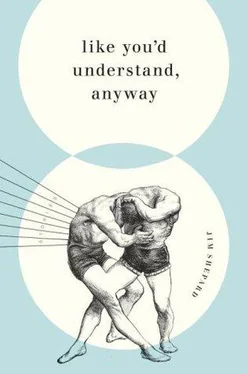If such a height of land does exist, then everything north of it must necessarily flow into an as yet undiscovered watershed: a vast inland sea.
April 7th
Today's resolution: “Strive, and hold cheap the strain.” We have set a guard, and impressed upon the men the necessity of vigilance. And the danger of the journey ahead. Tomorrow we step off into the first truly daunting territory, leaving the southern watershed behind. The aborigines call our resting place Dead Man's Flat. The men in high spirits, the animals in good order. Up late, too agitated for sleep, my mind full of a thousand small tasks, and marveling on this strange, strange country, where even the celestial sphere is the wrong way about.
April 8th
Even as a child, I'd pressed my hand to the map of Australia in my Boys' Atlas , palming the blank upon its center. Our biggest cities are but specks perched on the extreme southern and eastern tips of a vast unknown. Men of perseverance and resource have failed to penetrate that remote and oblique vastness. Stowitts set off from the NE coast with the idea of crossing to Perth, and together with his entire expedition was never heard from again. The entire area seems so fearsomely defended by its deserts, one might suppose Nature has intentionally closed it to civilized man.
Browne has pointed out to me in the privacy of my tent that the governor's charge says nothing about an inland sea. My father too tried to strike the boat from the budget list. Browne believes, with them, that the great center is likely to prove in its entirety to be inhospitable desert. But I paid the cost of the whaleboat with my own funds. Explorers have recorded countless westward-flowing streams, none of which empty into the southern ocean. Where do these waters go if not to an immense sea or lake to which there must exist a navigable entrance? I believe the continent to be fashioned like a bowl, with elevated sides and a sunken center, a bowl whose lowest points are likely to be filled with water. “A bowl,” Browne said with some unhappiness when I outlined for him my thinking.
And imagine if that sea disembogues into the northern ocean, by way of some strait, I reminded him. “The Beadle Sea,” he smiled, as though indulging a child he loved very much. We were together relashing the bundle containing our charter and various maps, such as they were. “The Browne Strait,” I added, in order to see him smile again.
April 10th
Browne too has had a vexed relationship with his father, whose unfortunate speculations in corn when Browne was still a child left the family nearly without resource. He admitted during his interview that he had reaped few benefits, emotional or financial, from his parents. He has, nevertheless, turned himself into a young man of no little account. He brings to our group an artist's spirit and a Zouave's resourcefulness. As well as an apostate's skepticism. During a supper gathering of the officers, I listed the altogether beneficial ways in which our various virtues interacted. Hill, I pointed out, besides his skills as a healer, is also a man of refined manners, a genteel disposition, and a sensitive temperament. Mander-Jones has a scientist's exactitude and love of order. Our virtues together, I suggested, comprise one ideal explorer. “Of frustrated ambitions,” Browne pointed out. A short while after our discussion, one of the men shot what Mander-Jones informs us is a new sort of butcher-bird, very scarce and wild.
April 13th
Today's resolution: “To love is to be all made of sighs and tears; to be all made of faith and service.” Named a dry creek bed of some size Beale Creek, to reward the fellow for the labor of having surveyed it. Sufficient saltbush, which the horses eat readily. Some small, fawn-colored kangaroo, of which the dogs have killed four. No elevation of any kind breaks the horizon or varies the sea of scrub ahead. At first there will be the appearance of improvement, then barren country again. During our evening meal Browne asked if the governor or Lord Stanley had any knowledge of the whaleboat. I told him that they had made clear to my satisfaction that they had every confidence in myself and my decisions. Cup-page reports that his pain is very bad when he mounts or dismounts. Browne considers it a poor sign that our armorer has managed to shoot himself.
April 14th
All day the sun through heavy clouds, which checked some of its fiery beams. Nothing about but a few coleopterous insects. “Beetles,” Browne corrects me, a little peevishly. After encampment we observed four or five signal fires. The aborigines are apparently retreating before our advance.
April 16th
No sign of a previous civilization. Not an arrowhead, not a flint, not even the remains of a cooking fire. Everything suggests an ongoing and immemorial enervation. A kind of trance in the air.
April 17th
Here in this wilderness, we intruded upon an extraordinary gathering: a group of five white men seated upon the ground, weeping. They seemed to have about them ample supplies, and to be without injury. Nothing would make them explain the cause of their grief. In the end we were obliged to continue on our way. Purdie, the cook, in particular, has remained quite upset by the incident.
April 20th
A stretch of better country, over which we have made good progress. Found a native wheat and a rye, and in hollows a purple vetch of which the cattle are very fond. Crossed an entire plain covered with perfectly spherical stones. Formed by the action of water, no doubt, when the plain was — or is — undersea.
At times the land ahead is as flat as a table. The birds are remarkable: ibis with their coral eyes; emus, striding about like enormous indignant chickens on their startling claws; olive green and yellow butcher-birds circling on their updrafts to gain height. Something Mander-Jones calls a “ventriloquist dove,” which, with no movement of its throat, makes a sound that seems to come from the distant horizon. We are taking notes and collecting specimens whenever possible. We all feel the exhilaration of putting our other lives behind us. Mack, with Cuppage laid up, has had unusual success shooting pigeons. Today's resolution: “Look round the habitable world! How few know their own good; or knowing it, pursue.”
April 21st
A close, humid day which produced an incessant clamminess over the body and called forth innumerable insects. Mander-Jones bitten on the scalp by a centipede in his hat. The dogs killed a fine specimen of something that had been following us, but in the ensuing scuffle they tore off its head. It rained gently in the morning.
April 22nd
When I was less than five years old, I am told, I dragged around behind me on a cord a legless horse to which I was inseparably attached. The poor thing bounced and tumbled along in a most pitiful way, as I remember. No one knew from whence it came. It was a carved lump of pine painted with a blue saddle. It had a mouth but no eyes. I slept with it and named it My Captain, to the puzzlement of those who gave it any thought.
April 23rd
Plagued by the flies, and the rain has brought out the death adders and other snakes. Eight-inch centipedes with ghastly jaws, fearless, mouse-sized scorpions, ubiquitous stinging ants. Men glad of moving on.
Browne at our officers' supper again lodged a complaint concerning the number of water casks we carry (two), which he sees as woefully inadequate. He reminded us all that we're doing what we've been expressly advised by those familiar with the country not to do: travel with no line of communication to our rear and no maps for our forward journey. His reassuring prudence was duly recorded. In order to demonstrate our congru-ency on this point I cited for him yesterday's resolution, which was “Take care of the minutes, for the hours will take care of themselves.”
Читать дальше












